


February 28, 2024 by
David Allen

Marble floors whisper luxury, yet shout for maintenance; your elegant investment demands attention, but not necessarily at a high cost.
As you navigate the upkeep of your home’s shining centerpiece, you’ll find that simple, cost-effective strategies can preserve its luster without draining your wallet.
You must regularly dust mop to prevent scratches, concoct your own cleaning solutions to avoid harsh chemicals, and tackle spots with precision to maintain the stone’s integrity.
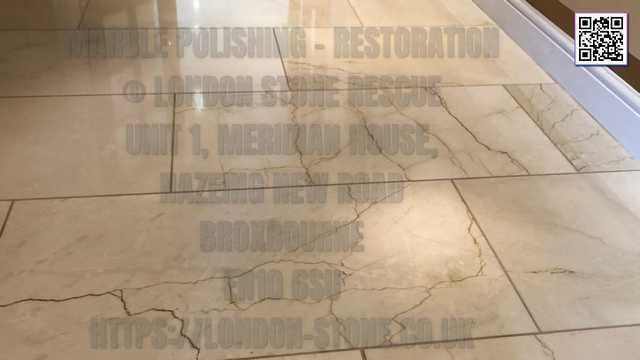
Moreover, the use of protective mats can be a game-changer, and you might be surprised at the polishing power of a common kitchen ingredient.
Let’s explore how these straightforward measures can ensure your marble floors remain the envy of your neighborhood, and how a little know-how can save you from costly professional services.
Regular dust mopping is essential to keep your marble floor looking spotless and to prevent scratches from everyday dirt and debris. You’ll want to use a soft, non-abrasive dust mop to gently sweep the surface. Don’t use a vacuum cleaner unless it has a setting for hard floors; otherwise, you risk dragging grit across your marble, causing damage.
Do this daily, or even multiple times a day in high-traffic areas—it’s key in maintaining that pristine shine.
And remember, if you spill anything, don’t wait! Clean it up immediately to avoid stains settling into your marble’s porous surface.
With consistent care, you’ll ensure your floors remain timeless and elegant for years to come.
For an effective and gentle homemade cleaner, mix a few drops of mild dish soap with warm water and apply it to your marble floors with a soft cloth. This simple solution lifts dirt without damaging the marble’s delicate surface. After cleaning, rinse the floor with clean water to remove any soap residue. Then, dry the area promptly with a soft towel to prevent water spots.
For stubborn stains, create a paste of baking soda and water. Apply it to the stain, cover with plastic wrap, and let it sit overnight. Gently wipe away the paste the next day and rinse thoroughly.
Always avoid acidic cleaners, like vinegar, which can etch marble. Regular use of your DIY solution keeps your marble floors looking pristine.
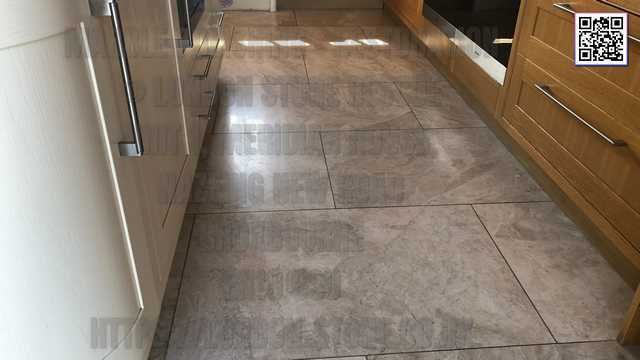
While your DIY cleaning solutions work well for general upkeep, tackling specific spot stains on marble requires a more targeted approach. You’ll need to act fast; marble is porous and can absorb stains quickly.
For organic stains like coffee or wine, create a paste of baking soda and water. Apply it directly to the stain, cover with plastic wrap, and let it sit for 24 hours before rinsing.
If you’re dealing with oil-based stains, use cornstarch instead of baking soda. Be gentle when you’re applying the paste and when you wipe it off—scrubbing too hard can damage the marble’s surface.
Always finish by drying the area thoroughly to prevent any water spots from forming.
To safeguard your marble floors from scratches and spills, consider placing protective mats and rugs in high-traffic areas. These barriers act like a shield, taking on the daily wear and tear that would otherwise damage your elegant surfaces. Choose mats with a non-slip backing to prevent accidents and ensure they stay in place.
When you’re picking out rugs, opt for ones that won’t trap moisture. This is crucial, as dampness can harm the marble underneath. Regularly clean these mats and rugs to stop dirt from being transferred onto the marble, which could scratch and dull the finish.

Don’t forget to pick up the mats occasionally and give the floor underneath a thorough cleaning to maintain its luster.
You can restore your marble floor’s shine with a simple baking soda polish. All you need is a little water and some baking soda.
First, mix three tablespoons of baking soda with enough water to form a paste. Make sure it’s not too runny; you’re aiming for a thick consistency.
Next, apply the paste to your marble floor, focusing on dull or stained areas. Use a soft cloth to rub the paste into the surface in a gentle, circular motion. Don’t scrub too hard; let the baking soda do the work.
Once you’ve covered the area, rinse it off with clean water and dry the floor with a soft towel. You’ll notice an immediate difference as the natural shine returns.
You can fix small scratches or chips in marble flooring by gently sanding the area with fine-grit sandpaper.
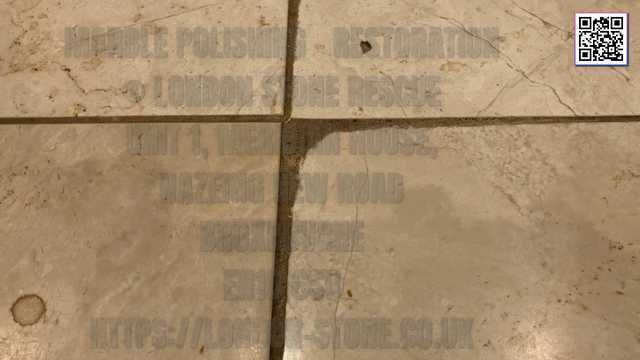
After sanding the area, you can apply a matching marble polish to restore its shine.
To prevent dullness in high traffic areas, use rugs to minimize wear.
Regularly dust your marble floors.
It’s also important to clean spills quickly to avoid stains and etching.
You shouldn’t use a steam mop on marble floors as it can cause damage. The heat and moisture may deteriorate the stone, leading to potential discoloration or cracking over time.
Stick to gentle cleaners.
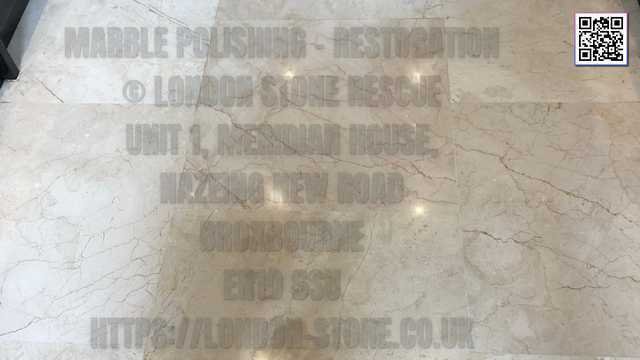
You’ll need to gently buff out the etch marks with a marble polishing powder.
Rinse thoroughly, then dry with a soft cloth to restore your marble’s shine after acidic spills.
To preserve your marble floors, there are two key factors to consider: indoor humidity levels and temperature control.
First, it is important to keep indoor humidity levels between 30-50%. High humidity can cause marble to become porous and absorb moisture, which can lead to discoloration, staining, and even cracking. On the other hand, low humidity can cause marble to become dry and brittle, increasing the risk of it cracking or chipping.
Secondly, maintaining a consistent temperature is crucial. Ideally, the temperature should be kept between 60-80°F. Extreme temperature fluctuations can cause marble to expand and contract, which can result in cracks or fissures. It is important to avoid exposing marble floors to excessive heat or cold, such as placing hot pans directly on the surface or using harsh chemicals for cleaning.
Keep your marble floors shining without breaking the bank. Remember to dust mop regularly to prevent scratches, whip up your own cleaning solutions for a gentle cleanse, and tackle stains promptly to keep them from setting.
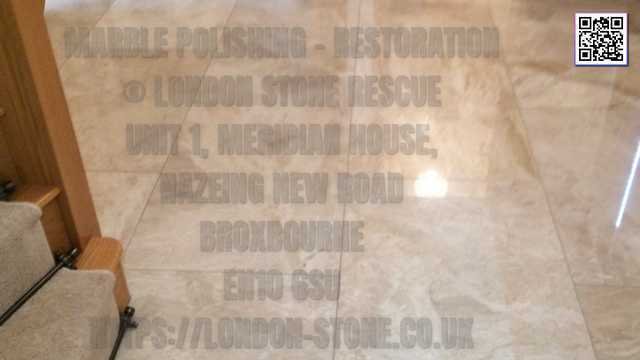
Lay down mats and rugs to shield high-traffic areas, and give your floors a homemade sparkle by polishing with baking soda.
With these simple, budget-friendly tips, you’ll maintain your marble’s luxurious look for years to come.